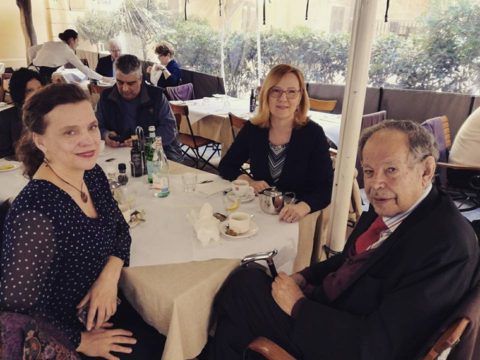How to improve wisdom?
One of the most important chapters of Finnish basic education curriculum is titled:
Thinking and learning to learn (First of the seven transversal competences)
Edvard de Bono writes in his book Textbook of Wisdom (Viking, 1996): “Wisdom is not all the same as cleverness. I have known many people who are very clever indeed within their own field (even winning Nobel prizes) but not especially “wise” outside their own fields of study. Cleverness is like a lens with a very sharp focus. Wisdom is more like a wide-angle lens.” He continues: “Wisdom is more about perspective than about detail. Cleverness is about how we get information and how we use information. Wisdom is about how the information fits into the world around and our own values.”

Edward de Bono sharing ideas with Learning Scoop experts in Malta
Regarding educational systems we have to think about the future and try to guess what kind of competences the new generations will need for facing the unknown future. Surely those competences are more or less related to thinking skills, wisdom, cleverness, and learning to learn. Cleverness is like having a library full of books and wisdom is knowing which book is relevant to read at this moment.
The New Finnish Curriculum for Basic Education highlights that “thinking and learning skills underlie the development of other competences and lifelong learning.” The way in which pupils learn to make observations and to seek, evaluate, edit, produce and share information and ideas forces them to improve their thinking skills. It is crucial that the teachers encourage their pupils to trust themselves and their views while being open to new solutions. Encouragement is also needed for facing unclear and conflicting information.
How the teachers will improve that? Curriculum gives some answers: “The pupils are guided to use information independently and in interaction with others for problem-solving, argumentation, reasoning, drawing of conclusions and invention.”
It is more than nice to recognize that curriculum really gives huge possibilities to use self-assessments and reflection: “Each pupil is assisted in recognizing their personal way of learning and in developing their learning strategies.
The pupils are guided to realize that information may be constructed in many ways, for example by conscious reasoning or intuitively based on personal experience. An exploratory and creative working approach, doing things together and possibilities for focusing and concentration promote the development of thinking and learning to learn. (National Core Curriculum for Basic Education 2014)
I want to believe that if the teachers and other educators really read carefully what is written in curriculum, reflect those sentences in wise way, they might educate our next generation to be prepared for unknown future. Edward de Bone writes in his book: Thinking to Create Value (Kite, 2015): “The new word “ebne” stands for “excellent but not enough”. By using this word you do not have to accept or deny the others point of view. You can accept it, but hold that it is not enough. Our existing thinking is ebne. It is excellent but not enough.
Juha Lahtinen
